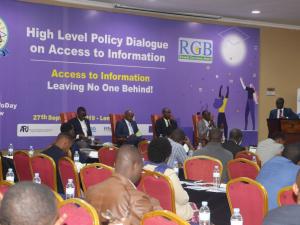
Collaboration between authorities and journalists, key issue to enhance Access to Information Law in Rwanda
Every 28th September, the world celebrates International Day of Universal Access to Information.
Six years since Rwanda enacted the Access to Information Law (AIL). The country was the 11th in Africa and the 94th globally to adopt an Access to Information Law.
The law enables the public and journalists to access information possessed by the public and some private institutions. It also recognizes the right to access to information, the procedures for accessing information, and compliance related issues.
The law should make it easier for anyone to access information from concerned institutions.
On 27 September 2019, government officials, representatives of Civil Society organizations and private sector as well as media practitioners met in a high level dialogue to discuss the role of access to information in good governance.
The discussion held during the dialogue focused on the Law N° 04/2013 OF 08/02/2013 relating to access to information and its related Ministerial orders with the theme “Access to Information-Leaving no one behind”. Participants discussed about existing barriers to access to information and appropriate measures to address them.
Participants in the dialogue revealed that there are still challenges impeding access to information due to low level of awareness about the Law N° 04/2013 OF 08/02/2013.
Regardless of the existence of this law, and some portals designed to ease the accessibility of information it is largely still difficult to access information from public officials.
Many journalists have complained that their inquiries for information have largely gone unanswered. This is despite the Ombudsman’s Office going as far as publishing a list of individuals in charge of providing information in public institutions.
Journalists say that for the law to be effective, it needs to be widely explained to government institutions, and particularly local authorities.
Ildephonse Sinabubariraga is a managing director of Ishingiro community radio, “The information that journalists seek is for public interest yet some institutions are very reluctant to release it,” he said, adding that Rwandans also need to be sensitized about their rights as far as access to information is concerned.”
While Article 14 and 15 of the Access to Information Law requires all private organizations to appoint an information officer to deal with information requests, most journalists say they find that most of the officers were not well-trained or equipped with the tools to handle their jobs.
The law defines the procedures for accessing information. For instance, any individual or a group of persons can apply for information with no fees required, except some postage and paper charges.

